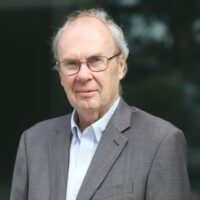Episode 99: Transatlantic Risks in 2024

Jeff Rathke
President of AGI
Jeffrey Rathke is the President of the American Institute for Contemporary German Studies at the Johns Hopkins University in Washington, DC.
Prior to joining AICGS, Jeff was a senior fellow and deputy director of the Europe Program at CSIS, where his work focused on transatlantic relations and U.S. security and defense policy. Jeff joined CSIS in 2015 from the State Department, after a 24-year career as a Foreign Service Officer, dedicated primarily to U.S. relations with Europe. He was director of the State Department Press Office from 2014 to 2015, briefing the State Department press corps and managing the Department's engagement with U.S. print and electronic media. Jeff led the political section of the U.S. Embassy in Kuala Lumpur from 2011 to 2014. Prior to that, he was deputy chief of staff to the NATO Secretary General in Brussels. He also served in Berlin as minister-counselor for political affairs (2006–2009), his second tour of duty in Germany. His Washington assignments have included deputy director of the Office of European Security and Political Affairs and duty officer in the White House Situation Room and State Department Operations Center.
Mr. Rathke was a Weinberg Fellow at Princeton University (2003–2004), winning the Master’s in Public Policy Prize. He also served at U.S. Embassies in Dublin, Moscow, and Riga, which he helped open after the collapse of the Soviet Union. Mr. Rathke has been awarded national honors by Estonia, Latvia, and Lithuania, as well as several State Department awards. He holds an M.P.P. degree from Princeton University and B.A. and B.S. degrees from Cornell University. He speaks German, Russian, and Latvian.
__

Julian Mueller-Kaler
Stimson Center
Julian Mueller-Kaler is the Director of the Strategic Foresight Hub in the Executive Office at the Stimson Center and also serves as Chief of Staff to the President and CEO. He coordinates and manages special projects, advises on strategy, and supports institutional advancement. As director of the Hub, he researches global trends, evaluates the implications of emerging technologies on society and politics, and writes about the rise of populism, US-China relations, and the future of the liberal international order.
Before joining Stimson, Mueller-Kaler was a resident senior fellow with the Atlantic Council GeoTech Center and the Scowcroft Strategy Initiative where he worked on the geopolitics of technology and lead the GeoTech Center’s AI Connect program – a joint work stream with the U.S. Department of State that encouraged the responsible stewardship of AI technologies in the Global South. He also serves as a non-resident fellow at the American-German Institute, is an associate fellow at German Council on Foreign Relations (DGAP) in Berlin, and previously consulted in the office of the German Executive Director at the World Bank Group. Mueller-Kaler graduated as a Fulbright-Schuman scholar (MA) from Georgetown University’s School of Foreign Service and holds a degree in International Relations (BA) from Zeppelin University in southern Germany.
He was a 2017-2018 participant in AICGS’ project "A German-American Dialogue of the Next Generation: Global Responsibility, Joint Engagement," sponsored by the Transatlantik-Programm der Bundesrepublik Deutschland aus Mitteln des European Recovery Program (ERP) des Bundesministeriums für Wirtschaft und Energie (BMWi).

Mathew Burrows
Stimson Center
Mathew Burrows is the Program Lead of the Stimson Center’s Strategic Foresight Hub and a Distinguished Fellow with the Reimagining US Grand Strategy program. Prior to joining Stimson, he served as the director of Foresight at the Atlantic Council’s Scowcroft Strategy Initiative and as the co-director of the New American Engagement Initiative.
Burrows is one of the leading experts on strategic foresight and global trend analysis. In 2013 he retired from a 28-year-long career in the State Department and the Central Intelligence Agency (CIA), the last 10 years of which he spent at the National Intelligence Council (NIC), the premier analytic unit in the US Intelligence Community. In 2007, Burrows was appointed Counselor, the number three position in the NIC, and was the principal drafter for the NIC publication, Global Trends 2030: Alternative Worlds, which received widespread recognition and praise in the international media. In 2005, he was asked to set up and direct the NIC’s new Long Range Analysis Unit, which is now known as the Strategic Futures Group.
Burrows received a BA in American and European history from Wesleyan University and a PhD in European history from the University of Cambridge.
2024 will be a year of crisis and change—the Russian aggression against Ukraine, conflict in the Middle East and Africa; the continuing effects of climate change; and the biggest election year in history. Mathew Burrows and Julian Mueller-Kaler of the Stimson Center’s Strategic Foresight Hub join the podcast to discuss the greatest risks to the transatlantic partnership this year: the impacts of presidential candidate (and potential winner) Donald Trump’s “anti-globalist” agenda, a potential stalemate in Ukraine, increasing cooperation between China and Russia, and European instability and internal divisions. And more importantly, how can the United States and Europe act now to ensure their security and interests in a destabilizing global order?
Articles mentioned in this episode:
A Second Trump Term: Opportunities and Risks
The Unpredictable But Entirely Possible Events That Could Throw 2024 Into Turmoil
Host
Jeff Rathke, President, AGI
Guests
Mathew Burrows, Program Lead, Strategic Foresight Hub, Stimson Center
Julian Mueller-Kaler, Director, Strategic Foresight Hub, Stimson Center






